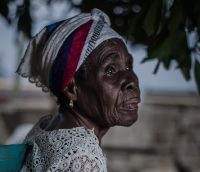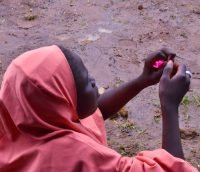 By Yecenu SasetuI looked forward to the harmattan period as a child growing up in Jos, Plateau state. I wasn’t a fan of the dust but I loved the cold weather because then I got to wear cool jackets and pretend I was abroad. I especially loved December because of the holidays which meant eating, playing and watching Home Alone. It also meant huddling together as a family on the couch under heavy blankets to keep warm.
By Yecenu SasetuI looked forward to the harmattan period as a child growing up in Jos, Plateau state. I wasn’t a fan of the dust but I loved the cold weather because then I got to wear cool jackets and pretend I was abroad. I especially loved December because of the holidays which meant eating, playing and watching Home Alone. It also meant huddling together as a family on the couch under heavy blankets to keep warm.I no longer live in Jos but when I do visit, I don’t experience the cold as it used to be. Although Jos is still colder than many parts of the country, it is no longer the famous cold city. This is the impact of climate change.
Global Conversations
Conversations about climate change are currently expanding as world leaders, activists, scientists, researchers, journalists, and even health advocates are all exploring ways climate change is affecting human life. Nigeria Health Watch, for example, brought together leading experts to the Future of Health Conference to share insights into the nexus between climate change and health.
With the theme ‘From Evidence to Action: Building Resilience at the Climate-Health Nexus’, discussions focused on the intersection of climate change and health, and the urgent need for action.
Let us start with this staggering statistics: the World Health Organisation (WHO) predicts that between 2030 and 2050, climate change is expected to cause approximately 250,000 deaths per year.
Climate is a Health System Agenda
Part of the discussion was on ‘Building Climate-Resilient Health Systems for Global Health Security’. This session was moderated by Dr. Chijioke Kaduru, Managing Director, Corona Management Systems, and had the following panelists.
- Desta Lakew, Group Director of Partnerships and External Affairs at Amref Health Africa
- Dr. Winifred Ukponu, Associate Director (Global Health Security) at Georgetown University Center for Global Health Practice and Impact (West And Central Africa)
- Nanlop Ogbureke, Executive Director Of Resolve to Save Lives (RTSL) in Nigeria
- Abdulhamid Yahaya, Deputy Director, Global Health Informatics

Dester Lakew shared data on the impact climate change is currently having on the African Region in her presentation. “Nigeria, Niger, Mali are experiencing floods. This is washing away farm lands, affecting food production, impacting livelihoods and disrupting health services to the most vulnerable in the communities.”
Her data also showed that malnutrition has gained in Zimbabwe, Malawi and Zambia, which is directly caused by drought. So far, 212,630 people have been displaced in Kenya from flooding and approximately 13 million people in Ethiopia have been affected by drought, with four million internally displaced.
She also shared that “in 2023, climate change triggered cholera outbreaks in 19 African countries resulting in over 250,000 cases and over 4,000 deaths. Africa is not only at risk of climate disaster but we have less adaptive capacity and preparedness to respond to the threats making the region highly vulnerable.”
The reality is, climate change is no longer an environmental crisis. It has fully become a health crisis. There is a rise of malnutrition due to food shortages, the emergence of infectious diseases, the disruption of health services which in turn impact on people managing their illnesses, the displacement causing uncertainties and anxiety.
Desta Lekew laid out the challenges Africa is facing even though our continent is responsible for less than four percent of the greenhouse gas emissions but it is the most impacted by climate change. She recommended that “the way out of the crisis is to prioritize Universal Health Coverage, mainstream climate into health actions, and integrate climate resilience into health systems. It means building climate resilient health systems to ensure that we can effectively prepare for, detect, respond and recover from climate induced health threats.”
To create a resilient health system means to leverage on technological innovations. Dr Yahaya Abdulhamid, emphasize key lessons from the COVID-19 pandemic and laid out five key points to building a climate resilient health system:
Climate-Proof Health Facilities that can withstand climate impacts and remain operational during crises.
Strengthen Technological Infrastructure by upgrading laboratory management information systems, logistics, and internet connectivity.
Leverage Data for informed decision-making in health interventions.
Multi-Sectoral Collaboration to overcome data ownership challenges and facilitate collaboration across sectors.
Safety Nets And Climate-Adaptive Health Insurance which can provide concessions for climate-related disasters.
Community is at the Center of Interventions
One key word that was prominent during the panel discussion was Community. Nanlop Ogbureke stated boldly that, “Climate change is indeed a social justice issue, intertwined with health as a human right. The COVID-19 pandemic highlighted the importance of inclusive solutions, considering diverse populations, especially vulnerable groups such as pregnant women, persons with disabilities, and those living in poverty.”
She highlighted the need to prioritize:
Inclusive Health Services that recognize and address the unique needs of various populations, including women, children, and marginalized communities.
Climate-Sensitive Programs that integrate climate considerations into health security plans, tracking indicators, and policies.
Speaking also on the need to prioritize community, Dr Winifred Ukponu recommended that it was important to train healthcare workers, public health professionals, and other stakeholders in emergency management and climate-resilient health systems.
She also recommended leveraging Existing Structures by collaborating with existing partners and organizations working on climate and health solutions.
Key Takeaways
The key takeaways from this event were:
Climate change already impacts global health security, increasing public health events and disrupting essential services.
Social, business, and technological innovations are underway to address these challenges.
Enhanced sectoral collaboration and resource mobilization are crucial to scaling up effective solutions.
Solutions come from home, and communities understand their needs.
***
This conversation resonated with me because today, I can only share the glory that was the weather in Jos, Plateau State. If we do not take the steps needed to build climate-resilient health systems, and address climate change as a whole, our stories of our cities’ past may not only be woven with nostalgia, but may be told with dread and doom.






